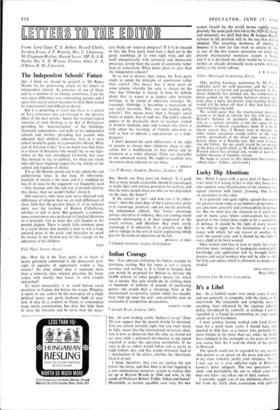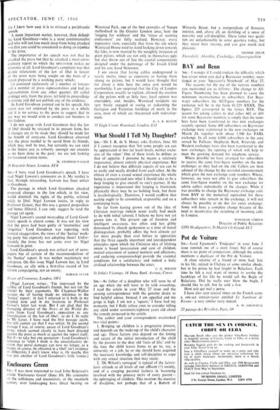It's a Libel • SIR, —As a faithful reader over many
years, I enjoy and am generally in sympathy with the views of the . SPECTATOR. My enjoyment and sympathy have, if anything, been enhanced by the vigorous editorial policy introduced by yourself, so perhaps I can be regarded as a friend in commenting on your recent attack on Lord Goodman.
, I must confess, having worked with Lord Good- man for a good many years, I should have been puzzled to find that, as a lawyer who probably has more friends in the press than any .other, he should have indulged in the onslaught on the press of which you accuse him. So, I read the whole of his speech in Hansard.
The speech could not be regarded by any reason- able person as an attack on the press and does not: in my view, remotely justify your strictures. Nor. it I may say so, is your editorial reply to Professor Gower's letter adequate. The two quotations t.lo cited—and particularly the one to which your note does not refer—are taken out of their context.
I certainly acquit you of any deliberate distortion. . but from my fairly close association with political
life I know how easy it is to misread a periphrastic speech. A more important matter, however, than defend- ing Lord Goodman—who is a stout controversialist and who will not lose much sleep from being attacked —is that you could be considered as doing an injustice to the press.
The importance of his speech was not that he attacked the press but that he attacked a most extra- ordinary report to which the SPECTATOR makes no reference at all. Lord Goodman's complaint was that drastic relaxations of the law of libel in favour of the press were being sought on the basis of a report prepared by a working party which: (a) consisted exclusively of a number of lawyers and a number of press representatives and had no representation from any other quarter; (b) called evidence only from the press; (c) held its proceedings in private and did not publish any of the evidence.
As Lord Goodman pointed out in his speech, this report was not endorsed by the press as a whole and it is no service to the press to suggest that in any way we would wish to conduct our business in this fashion.
I do not agree with Lord Goodman that the law of libel should be retained in its present form, but if changes are to be made they should be made for the benefit of everyone. Lord Goodman observed that the press needed to be saved from its friends, which may well be true, but certainly we can exist in the future just as robustly amongst our enemies as we have done in the past: we are not looking for favoured nation terms.































 Previous page
Previous page